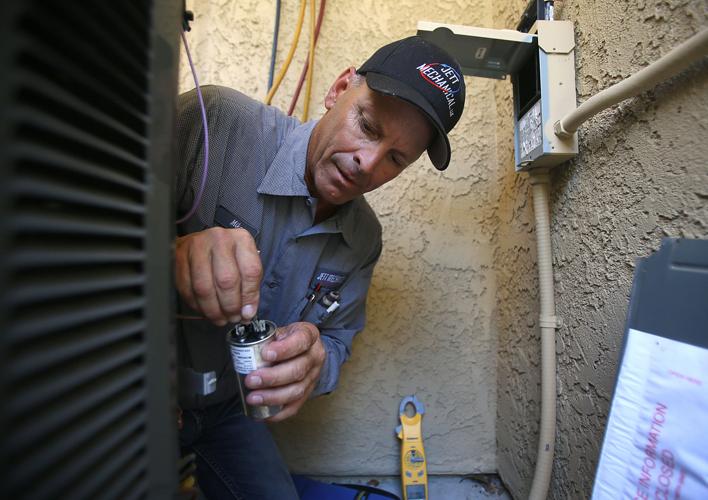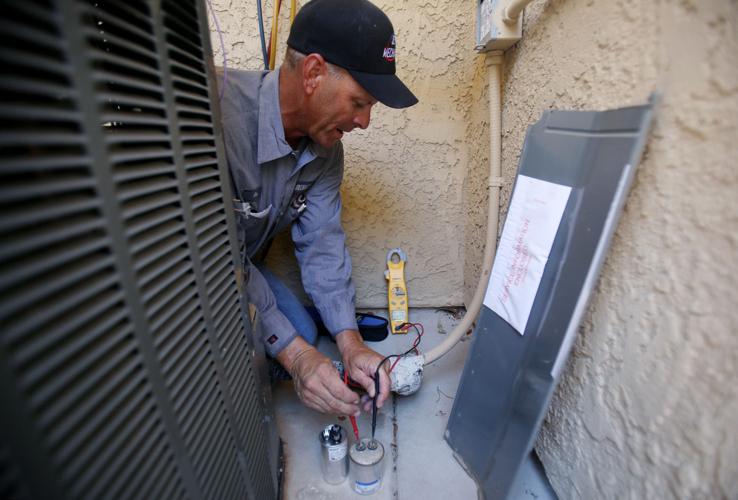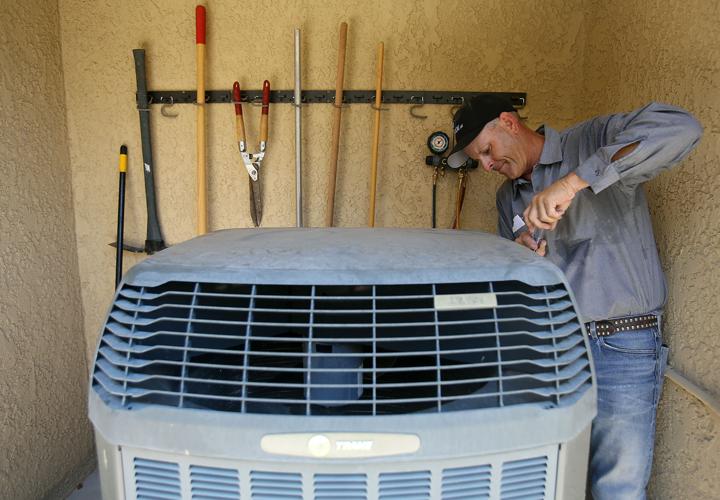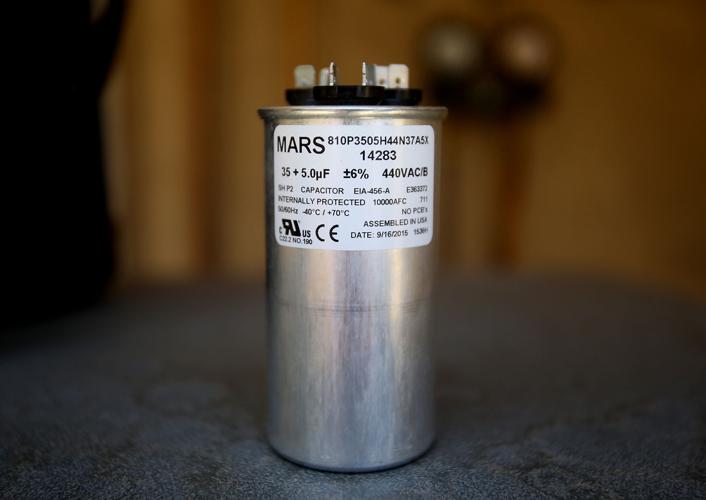The moment can conjure only one feeling — dread.
The family gets home from that cool San Diego vacation, a week of beach time, breezes and walking-around weather.
On the drive home through Yuma, the display inside the car shows the outside temperature climbing to triple digits and staying there. A stop along the way lets the family know that blistering temperatures well into September await. The saving grace is that the trusty air conditioner at home will make it bearable because, after all, “it’s a dry heat” and keeping cool isn’t impossible in Tucson.
And then the front door at home swings open. Heat from inside the house blasts the family, along with the unmistakable musty scent of a home that has been without air conditioning for a week or so.
What’s next?
Depending on what’s wrong with the air conditioner, a homeowner is looking at a bill of a couple of hundred dollars to thousands.
Melinda Bernal and her family got a double-whammy this year by having to completely replace the air-conditioning units in both their main home and their guest house, which is occupied.
The price tag for each was more than $8,000.
“It’s just awful,” she said. “It’s such a big ordeal.”
The second unit was diagnosed two weeks ago with a leak in the system holding the refrigerant, which can’t be fixed, requiring the whole system to be replaced. The first unit was the victim of the dreaded burned-out compressor.
Bernal and her family didn’t experience the vacation scenario, but Mike Whitacre, owner of Jett Mechanical, a local heating and cooling company, said that an air conditioner malfunctioning while the homeowner is away can multiply the cost of repairs, not unlike the additional damage that can be done to the engine of a car when it continues to run without oil.
Similarly, if an owner senses something is wrong with the unit and doesn’t get it fixed, it can get worse to the point of replacement.
Wade Hamstra, owner and vice president of Hamstra Heating & Cooling, said homeowners have to realize that their air-conditioning unit is “the most expensive appliance in your house” and should be treated at least as well as that other expensive possession, your car.
Unfortunately, he said, homeowners rarely do the equivalent of looking under the hood when it comes to their air conditioners.
“Your air conditioning, if it’s a good unit, could be anywhere from $6,000 to $15,000. Taking care of it is a huge deal,” Hamstra said. “But like anything else, it’s out of sight, out of mind until something goes wrong with it.
“Something that consumers in Tucson and Arizona in general have to consider is the fact that big companies are building AC units that run in all climates.
“We’re a very extreme environment. You’re putting in a unit that was designed to handle 100 degrees outside and we have days where it’s 115. It’s like having a Jeep and you go off-roading every single weekend.”
Contractors recommend maintenance at least once a year, preferably twice— significantly less than the four or five times a year that a car owner should change the oil in the vehicle. And that is about the only prevention a homeowner can do so the air conditioner doesn’t go down during another hot summer.
The next question, if you still haven’t taken that summer vacation, then becomes, do you leave the equipment on or off while away for an extended time?
Again, like a car, Whitacre said, putting the unit to sleep—even for a short time—is not good for it.
“I advise that the equipment remain in the cooling position, but you can raise the temperature,” Whitacre said.
“If there are no pets, I would raise the temperature not to exceed 90 degrees. It keeps the humidity in check. It also keeps the equipment lubricated. If the equipment is in a sit-still position, that can also cause electrical and mechanical issues.”
The effect of keeping the equipment running goes beyond keeping it in working order, Whitacre said.
“You want to cycle equipment occasionally because if you don’t do that, especially in the summertime in Tucson, you can develop mold issues inside the home because humidity can gather, and it can create other issues. You can lose your candles, it can damage your paint, it can damage your carpet fibers by getting too hot.”
Therein is the answer to the age-old question: Is it better and less expensive to leave your air conditioner running when you’re out of the home, whether daily for work or longer for a vacation?
On its website, Tucson Electric Power advises raising the temperature of the air conditioning “10 to 15 percent” while you’re away and not shutting it down.
“I leave mine at 85 degrees,” Whitacre said of where he sets his thermostat while he’s not home.
The mental anguish of having air-conditioning problems in the summer is only a portion of the toll on a homeowner. There is the hit to the pocketbook.
If you’re lucky, the issue is something small, like a capacitor, which is a component that regulates the operation of the motor. Homeowners can expect to pay about $250 to replace a capacitor, which includes the diagnostic call and the actual repair, Whitacre said.
But if you’re not home and a capacitor goes bad or isn’t replaced right away, the motor still will try to run and can then overheat, leading to more-expensive repairs like replacing the compressor, generally the most expensive repair short of replacing the entire unit. Replacing a compressor costs, on average, about $2,000. Depending on the unit, it can be in the $1,500 range or can go as high as $3,000.
For the customer with limited means, organizations such as the Pima Council on Aging and Community Home Repair Projects of Arizona have programs to assist with arranging repairs and paying to get the work done right away to avoid what can be a dangerous situation in the summer heat.
When a customer calls during the summer, Whitacre said, every call is an emergency. Air-conditioning companies do everything in their power to provide same-day service, or at least within the first 24 hours.
“That is a challenging thing for all of us,” Hamstra said. “When we get those first couple of days that are 105 (degrees), 110, we get a massive number of air conditioners going down across the valley. Every single AC company is busy. Every single AC technician is working 60-70 hours a week.”
And then there’s the stress of picking a reputable company that might be getting thousands of your hard-earned dollars based on a snap decision made necessary by the importance of getting your air conditioning back to handle Tucson’s brutal heat.
There is not a local referral service geared specifically toward air-conditioning contractors. The Better Business Bureau has ratings and reviews on its website. There are other online sources of information with reviews. But in the end, it’s a bit of a crap shoot when there are about 200 air-conditioning contractors in Tucson, many of them, according to Hamstra, small, one-person businesses.
Hamstra said a significant amount of his business comes through personal referrals from customers.
Bernal said she got a referral for her air-conditioning contractor from her daughter, who knew someone at her son’s school who had a contractor they trusted.
“Tucson is a very word-of-mouth kind of community,” Hamstra said. “We do get quite a bit of our business from one person telling a neighbor or telling a friend. I encourage people to get online. Research the heck out of us.”







